Product Description
Laser Cutting Machine Air Compressor One Machine 15KW / 20HP Screw Type Air Compressor For Laser Cutting
Main Features:
1. The flexible belt will be automatically tensioned in use. Through adjusting the tension, minimize the loss of pressure and power, to enhance the efficiency of compression.
2. Using the precise spin-oil separator and special two-pole buffer separation, it can minimize the oil consumption, guarantee the outlet gas purity, and extend the lifetime of filter elements.
3. With the toothed V-belt, it has good heat dissipation, long life, higher gear drive and transmission efficiency, as high as over 98%.
Oil Filter: Good Quality filters ensure longer working life and save the maintenance time and cost.
Stainless Steel Hoses: High and low temperature resistant, high pressure resistant.
Compressed Air Vessel: Reduction of pressure drops and energy costs, quality air with low oil content.
Air End: Imported DLOL air end, advanced profile design.
Electric Motor: Premium efficiency Totally TEFC IP54/IP55 motor (Class F insulation) protects against dust and chemicals etc.
Air Filter: Two-stage dust removal and filtering system with efficiency of up to 99.9% even in heavy-duty environment.
Cooler: High quality aluminum material, alternating expression cooler fins, ensure the perfect radiating effect.
Technical parameters:
| Model | 20A/16 |
| Power | 20HP / 15KW |
| Pressure | 1.6MPa / 16bar |
| Air Flow | 1.0m3/min |
| Dimension | 1600*780*1600mm |
| Outlet size | G3/4 |
| Weight | 415KG |
Our workshop:
| After-sales Service: | Free Spare Parts |
|---|---|
| Warranty: | One Year |
| Lubrication Style: | Lubricated |
| Cooling System: | Air Cooling |
| Power Source: | AC Power |
| Cylinder Position: | Vertical |
| Customization: |
Available
|
|
|---|
.webp)
What are the advantages of using an air compressor in construction?
Using an air compressor in construction offers numerous advantages that contribute to increased efficiency, productivity, and versatility. Here are some key benefits of using air compressors in construction:
- Powering Pneumatic Tools: Air compressors are commonly used to power a wide range of pneumatic tools on construction sites. Tools such as jackhammers, nail guns, impact wrenches, drills, and sanders can be operated using compressed air. Pneumatic tools are often preferred due to their lightweight, compact design and ability to deliver high torque or impact force.
- Efficient Operation: Air compressors provide a continuous and reliable source of power for pneumatic tools, allowing for uninterrupted operation without the need for frequent battery changes or recharging. This helps to maintain a smooth workflow and reduces downtime.
- Portability: Many construction air compressors are designed to be portable, featuring wheels or handles for easy maneuverability on job sites. Portable air compressors can be transported to different areas of the construction site as needed, providing power wherever it is required.
- Versatility: Air compressors are versatile tools that can be used for various applications in construction. Apart from powering pneumatic tools, they can also be utilized for tasks such as inflating tires, cleaning debris, operating air-operated pumps, and powering air horns.
- Increased Productivity: The efficient operation and power output of air compressors enable construction workers to complete tasks more quickly and effectively. Pneumatic tools powered by air compressors often offer higher performance and faster operation compared to their electric or manual counterparts.
- Cost Savings: Air compressors can contribute to cost savings in construction projects. Pneumatic tools powered by air compressors are generally more durable and have longer lifespans compared to electric tools. Additionally, since air compressors use compressed air as their power source, they do not require the purchase or disposal of batteries or fuel, reducing ongoing operational expenses.
- Reduced Electrocution Risk: Construction sites can be hazardous environments, with the risk of electrocution from electrical tools or equipment. By utilizing air compressors and pneumatic tools, the reliance on electrical power is minimized, reducing the risk of electrocution accidents.
It is important to select the appropriate air compressor for construction applications based on factors such as required air pressure, volume, portability, and durability. Regular maintenance, including proper lubrication and cleaning, is crucial to ensure the optimal performance and longevity of air compressors in construction settings.
In summary, the advantages of using air compressors in construction include powering pneumatic tools, efficient operation, portability, versatility, increased productivity, cost savings, and reduced electrocution risk, making them valuable assets on construction sites.
.webp)
What is the energy efficiency of modern air compressors?
The energy efficiency of modern air compressors has significantly improved due to advancements in technology and design. Here’s an in-depth look at the energy efficiency features and factors that contribute to the efficiency of modern air compressors:
Variable Speed Drive (VSD) Technology:
Many modern air compressors utilize Variable Speed Drive (VSD) technology, also known as Variable Frequency Drive (VFD). This technology allows the compressor motor to adjust its speed according to the compressed air demand. By matching the motor speed to the required airflow, VSD compressors can avoid excessive energy consumption during periods of low demand, resulting in significant energy savings compared to fixed-speed compressors.
Air Leakage Reduction:
Air leakage is a common issue in compressed air systems and can lead to substantial energy waste. Modern air compressors often feature improved sealing and advanced control systems to minimize air leaks. By reducing air leakage, the compressor can maintain optimal pressure levels more efficiently, resulting in energy savings.
Efficient Motor Design:
The motor of an air compressor plays a crucial role in its energy efficiency. Modern compressors incorporate high-efficiency electric motors that meet or exceed established energy efficiency standards. These motors are designed to minimize energy losses and operate more efficiently, reducing overall power consumption.
Optimized Control Systems:
Advanced control systems are integrated into modern air compressors to optimize their performance and energy consumption. These control systems monitor various parameters, such as air pressure, temperature, and airflow, and adjust compressor operation accordingly. By precisely controlling the compressor’s output to match the demand, these systems ensure efficient and energy-saving operation.
Air Storage and Distribution:
Efficient air storage and distribution systems are essential for minimizing energy losses in compressed air systems. Modern air compressors often include properly sized and insulated air storage tanks and well-designed piping systems that reduce pressure drops and minimize heat transfer. These measures help to maintain a consistent and efficient supply of compressed air throughout the system, reducing energy waste.
Energy Management and Monitoring:
Some modern air compressors feature energy management and monitoring systems that provide real-time data on energy consumption and performance. These systems allow operators to identify energy inefficiencies, optimize compressor settings, and implement energy-saving practices.
It’s important to note that the energy efficiency of an air compressor also depends on factors such as the specific model, size, and application. Manufacturers often provide energy efficiency ratings or specifications for their compressors, which can help in comparing different models and selecting the most efficient option for a particular application.
Overall, modern air compressors incorporate various energy-saving technologies and design elements to enhance their efficiency. Investing in an energy-efficient air compressor not only reduces operational costs but also contributes to sustainability efforts by minimizing energy consumption and reducing carbon emissions.
.webp)
Are there air compressors specifically designed for high-pressure applications?
Yes, there are air compressors specifically designed for high-pressure applications. These compressors are engineered to generate and deliver compressed air at significantly higher pressures than standard air compressors. Here are some key points about high-pressure air compressors:
1. Pressure Range: High-pressure air compressors are capable of producing compressed air at pressures typically ranging from 1000 to 5000 psi (pounds per square inch) or even higher. This is considerably higher than the typical range of 100 to 175 psi for standard air compressors.
2. Construction: High-pressure aircompressors feature robust construction and specialized components to withstand the higher pressures involved. They are designed with reinforced cylinders, pistons, valves, and seals that can handle the increased stress and prevent leaks or failures under high-pressure conditions.
3. Power: Generating high-pressure compressed air requires more power than standard compressors. High-pressure air compressors often have larger motors or engines to provide the necessary power to achieve the desired pressure levels.
4. Applications: High-pressure air compressors are utilized in various industries and applications where compressed air at elevated pressures is required. Some common applications include:
- Industrial manufacturing processes that involve high-pressure air for operations such as air tools, pneumatic machinery, and equipment.
- Gas and oil exploration and production, where high-pressure air is used for well drilling, well stimulation, and enhanced oil recovery techniques.
- Scuba diving and underwater operations, where high-pressure air is used for breathing apparatus and underwater tools.
- Aerospace and aviation industries, where high-pressure air is used for aircraft systems, testing, and pressurization.
- Fire services and firefighting, where high-pressure air compressors are used to fill breathing air tanks for firefighters.
5. Safety Considerations: Working with high-pressure air requires adherence to strict safety protocols. Proper training, equipment, and maintenance are crucial to ensure the safe operation of high-pressure air compressors. It is important to follow manufacturer guidelines and industry standards for high-pressure applications.
When selecting a high-pressure air compressor, consider factors such as the desired pressure range, required flow rate, power source availability, and the specific application requirements. Consult with experts or manufacturers specializing in high-pressure compressed air systems to identify the most suitable compressor for your needs.
High-pressure air compressors offer the capability to meet the demands of specialized applications that require compressed air at elevated pressures. Their robust design and ability to deliver high-pressure air make them essential tools in various industries and sectors.


editor by CX 2023-10-01
China 15bar 16bar all in one screw air compressor for 1000w 1500w laser cutting machine air compressor parts
Error:获取返回内容失败,
Your session has expired. Please reauthenticate.
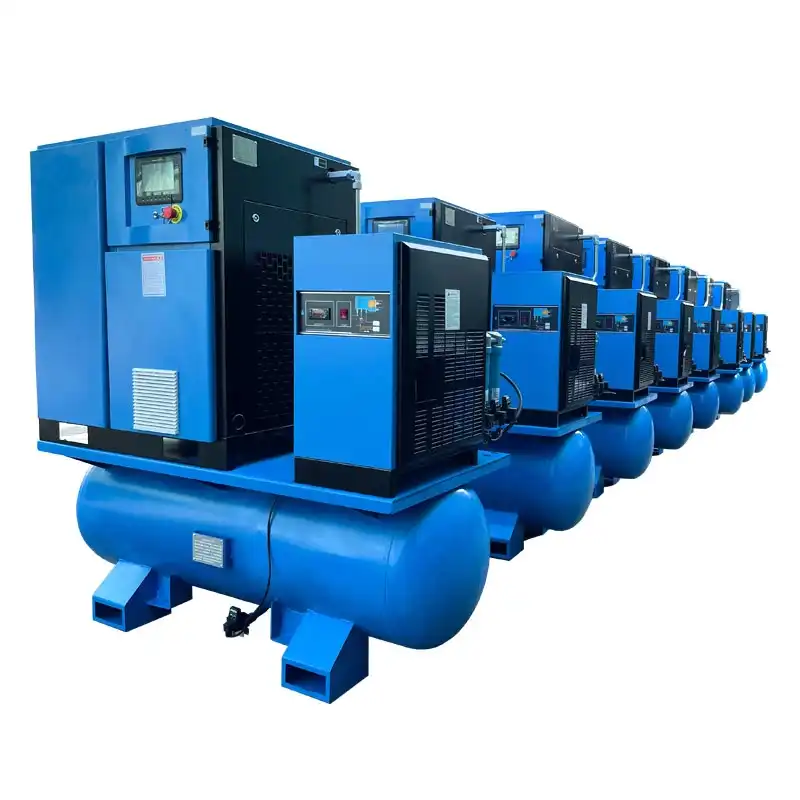
Choose an Air Compressor for Your Business
There are several factors to consider when choosing an air compressor for your business. One factor to consider is the type of compressor you are looking for, which may include single-stage, low noise, and positive displacement. Hope this article helps you make the right decision. After all, your business success will depend on this device! Let’s take a closer look at these factors. Also, consider what compressor manufacturers say about their products.
Positive displacement
Positive displacement air compressors compress air by drawing in a volume from an inlet and extruding it out of a chamber. This increases the pressure at which the gas can be pumped at rates that cannot be pumped through the outlet at lower pressures at higher mass flow rates. These types of compressors are available in single-acting and double-acting configurations. They are classified by the number of cylinders.
There are two different types of air compressors: reciprocating air compressors and screw compressors. Both are roll machines. Positive displacement air compressors use pistons and cylinders to compress air. The resulting air pressure builds up within the compressor housing, increasing the potential energy of the compressed air. Screw air compressors are the most popular positive displacement air compressors, which can be either single-stage screw-blade air compressors or multi-stage screw-blade oil-immersed screw air compressors.
Positive displacement flowmeters use a rotating measuring chamber to divide the fluid into discrete quantities. The number of times the chamber was refilled and emptied was used to estimate the total flow. However, positive displacement flow meters are prone to leaks, reducing the accuracy of the estimates. If a leak occurs, it can cause false readings and damage the compressor. However, leaks in positive displacement air compressors can reduce pressure.
The most common types of positive displacement air compressors are screw, reciprocating, and vane. Rotary positive displacement air compressors are also available as well as many other air compressors. Positive displacement air compressors are most commonly used in large manufacturing facilities. If you are considering an air compressor for commercial or industrial applications, it is imperative to understand how the components of the unit work. Please read the information below to learn more before deciding which application is best for you.
Positive displacement air compressors use a piston to force air into a chamber, compressing the air in the process. The piston moves in the opposite direction, thereby reducing the volume of the chamber. When the amount of air in the chamber reaches its maximum value, the valve opens, allowing it to escape at higher pressure. Positive displacement air compressors are generally less efficient than centrifugal compressors. However, they are still an excellent choice for a variety of applications.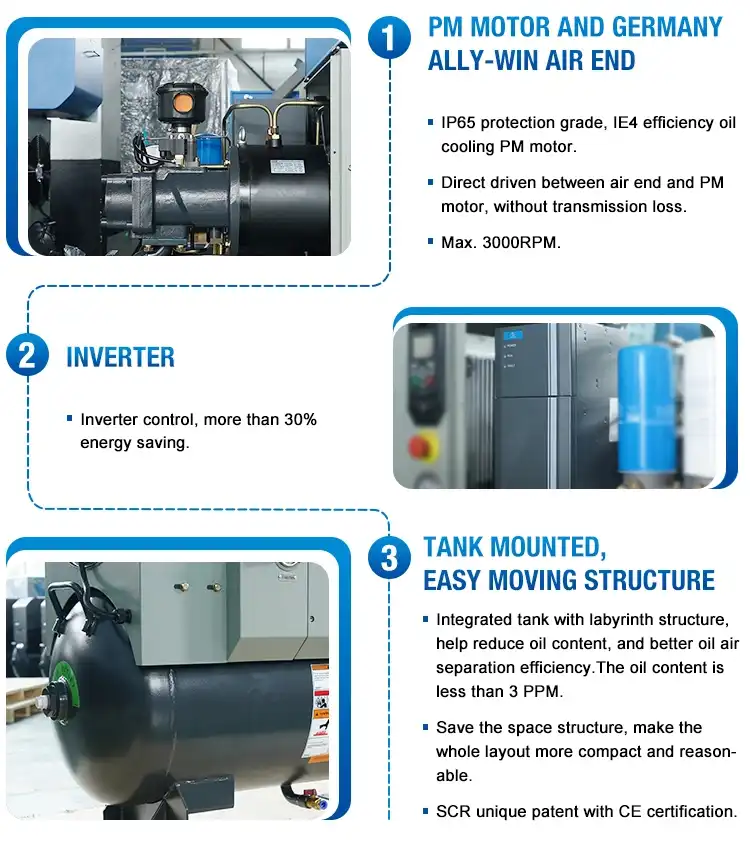
Single-stage
The discharge pressure of the single-stage air compressor is used to control the operation of the compressor. Properly designed load/unload controls allow the air compressor to operate at its most efficient point while minimizing stress on the main engine bearings. Single-stage air compressors can approach variable speed efficiency with appropriate storage capacity. However, improper storage can cause premature bearing wear on the main unit. If this is the case, a single-stage air compressor may not be ideal.
A single-stage air compressor has only one cylinder, which means one stroke is required to move air from one cylinder to another. Pressure is measured in cubic feet per minute or CFM. Tank size is also important as a large single-stage air compressor may be required to operate multiple air tools. Single-stage air compressors can be used in a variety of applications and can last for years.
For the most common uses, single-stage air compressors are the most practical option. These devices work with most hand tools, from hammers to grinders. Single-stage air compressors are lightweight and easy to move. However, two-stage air compressors provide more CFM, making them a better choice for industrial or commercial use. However, two-stage compressors are not suitable for private use. Therefore, if your main purpose is DIY and craft projects, it is better to choose a single-stage air compressor.
Compared with two-stage air compressors, single-stage screw air compressors are cheaper. They come from a variety of manufacturers and range in power from 3 to 600 horsepower. Single-stage air compressors are a cost-effective solution for a variety of air compressor needs. They offer flexibility and multiple control methods, making them an excellent choice for many different applications. Therefore, when choosing an air compressor for your business, choose the one with the most suitable functions.
Single-stage air compressors are the most affordable and easy-to-use air compressors for small to medium jobs. They also have higher compression ratios. The compression ratio is the ratio of absolute discharge pressure to absolute inlet pressure. When calculating the ratio, it takes into account atmospheric pressure and gauge pressure. The compression ratio pushes the surface area of the rotor, which increases the thrust load.
Single-stage air compressors are smaller and easier to transport than two-stage units. Single-stage air compressors have one air intake, and two-stage air compressors have two air intakes. The difference between single-stage and two-stage air compressors largely depends on the number of times the air is compressed. A single-stage air compressor compresses the air once, while a dual-stage air compressor compresses the same amount of air twice.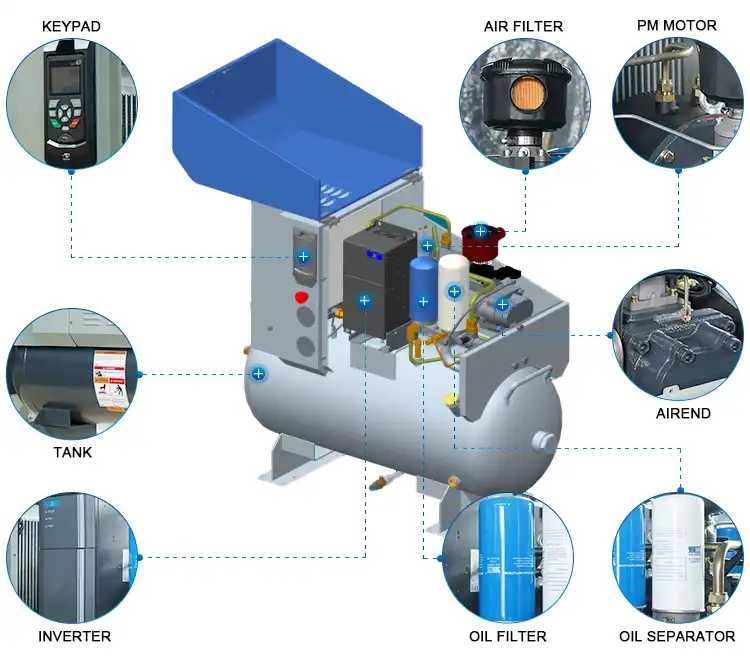
low noise
Low noise air compressors are ideal for a variety of applications. While no air compressor is completely silent, some models are much quieter than others. For the Hitachi EC28M portable compressor, the noise level is 59 decibels. The compressor features steel rollers that protect the internal components and give it a sleek, modern look. It also has a one-gallon fuel tank and a half-horsepower drive.
Noise from air compressors can be distracting and reduce productivity. It is important to choose low-noise air compressors to keep employees healthy and happy at work. While noise is an unfortunate aspect of working on the shop floor, reducing it can improve productivity. By reducing distracting noise, employees can focus on their work and communicate more effectively. That means higher quality work and happier clients. If you’re looking for a low-noise air compressor, be sure to read the tips below.
Low noise air compressors are an excellent choice for businesses of all sizes. These powerful tools can run multiple tools simultaneously. The two water tanks are made of rust-resistant aluminum and are stackable. This air compressor is heavier and can handle large jobs with ease. It costs more than other air compressors, but it can handle a lot of work efficiently. CZPT Air Tools air compressors come with a one-year warranty and are highly recommended by contractors.
Noiseless air compressors are generally more expensive than comparable products, but they are worth the extra cost. Noiseless compressors are a good option for businesses that need to avoid disturbing nearby people. For example, you might want to consider a low-noise air compressor for a dental office, which cannot tolerate noise. Fortunately, this problem can be solved by relocating the compressor to a location that is more isolated from your workspace.
One brand of low-noise air compressors offers two models. The CZPT Air Tools 2010A features a large cast aluminum can, regulating pressure gauge, and two universal quick-connects. It produces 68 decibels of noise when it works. It has a large 8-gallon fuel tank capacity and has wheels and handles for easy transport. Its powerful engine produces a low noise level of 68 decibels.
Another popular low noise air compressor is the Makita MAC210Q Quiet Series. This model is capable of producing up to 71.5 decibels of sound, which is the amount of air it produces at 90PSI. The MAC210Q features a durable oil-free pump and weighs just 36 pounds with a handle and wheels. These compressors are easy to move and ideal for indoor work.

editor by Cx 2023-06-28
China Laser Cutting Machine 16bar 11kw 300liter Compactscrew Air Compressor wholesaler
Solution Description
CZPT Integrated Compressor
Laser Chopping Equipment 16Bar 11KW 300Liter CompactScrew Air Compressor
one. Include screw air compressor + drinking water separator + air tank + air dryer + 3 line filter + drain valve.
16Bar Built-in Compressor Ideal for Laser Slicing Suggest:
one. 1 set 11KW Compressor suitable for 1set 1.5KW laser Cutting machine + 1set 3KW laser Slicing Machine.
two. 1 established 15KW Compressor suttable for 2 established 3KW laser cutting Equipment.
| Model | KW | HP | Mpa | Air Stream (CBM/MIN) | Noise dB(A) | Air Tank Quantity | Push Method | Commence Method | Dimension | Weight |
| ZAIH-fifteen | 11 | fifteen | 1.6 | 1.1 | 60 | 240Liter | Direct Travel | Frequency Conversion | 1500*760*1205 | 650KGS |
| ZAIH-20 | 15 | twenty | 1.4 | 850KGS |
The Voltage can be tailored:
208V/220V/380V/400V/415V/480V
50HZ/60HZ
Positive aspects:
one. Dimension will be little than standard 3 device independently, the dimension need to be less than 2CBM.
2. Easy Set up, electrical power on to begin the device only.
3. Airend is we custom-made in airend manufacturing unit, more time working time, larger capability( 25% larger than regular compressor), guarantee for 5 calendar year.
four. Personalized the cooler, more substantial the cooler dimension, the outlet dew point is about 4 to 10 degree.
5. Hose materials is stainless metal, no secondary Air pollution.
6. Double tank design and style, and secondary separation, take away the water increased than regular.
7. Its far more protection than normal compressor established, trigger this equipment no require to use the Oxygen and nitrogen.
|
/ Piece | |
1 Piece (Min. Order) |
###
| Lubrication Style: | Lubricated |
|---|---|
| Cooling System: | Air Cooling |
| Power Source: | AC Power |
| Cylinder Position: | Horizontal |
| Structure Type: | Closed Type |
| Installation Type: | Movable Type |
###
| Customization: |
|---|
###
|
/ Piece | |
1 Piece (Min. Order) |
###
| Lubrication Style: | Lubricated |
|---|---|
| Cooling System: | Air Cooling |
| Power Source: | AC Power |
| Cylinder Position: | Horizontal |
| Structure Type: | Closed Type |
| Installation Type: | Movable Type |
###
| Customization: |
|---|
###
How to Choose the Right Air Compressor
An air compressor uses pressurized air to power a variety of tools. They are most commonly used to power nailers and impact wrenches. Other popular uses for air compressors include paint sprayers and impact wrenches. While all air compressors have the same basic construction, their specialty differs. Ultimately, their differences come down to the amount of air they can push. Read on for information on each type of air compressor. These tools are great for many different purposes, and choosing the right air compressor depends on your specific needs.
Electric motor
While purchasing an electric motor for air compressor, compatibility is a key factor. Not all motors work with the same type of air compressor, so it’s important to check the manufacturer’s instructions before purchasing. By doing this, you can avoid wasting money on an incompatible motor. Another important consideration is speed. A motor’s speed is its rate of rotation, measured in revolutions per minute. It is critical that you purchase a motor with sufficient speed to meet the needs of your air compressor.
Typically, an electric motor for air compressor is 1.5 hp. It is ideal for use with medical equipment and metal-cutting machines. It also performs well under continuous operation and offers a high efficiency and energy-saving performance. Moreover, it features an attractive price, making it a good choice for a wide range of applications. If you are looking for a motor for an air compressor, look no further than a ZYS series.
A motor’s protection class indicates how the motor will operate. Protection classes are specified by the IEC 60034-5. These are stated with two digits and represent the protection against solid objects and water. For example, an IP23 rating means that the motor will be protected from solid objects, while IP54 means that it will protect from dust and water sprayed from all directions. It is vital to choose a motor with the correct protection class for your air compressor.
When choosing an electric motor, you should consider whether it’s compatible with the brand of air compressor. Some may be compatible, while others may require advanced electronics skills to repair. However, most air compressors are covered by warranty, so it’s important to check with the manufacturer if the warranty is still in effect before you spend a dime on a replacement. The motor should be replaced if it has failed to perform as designed.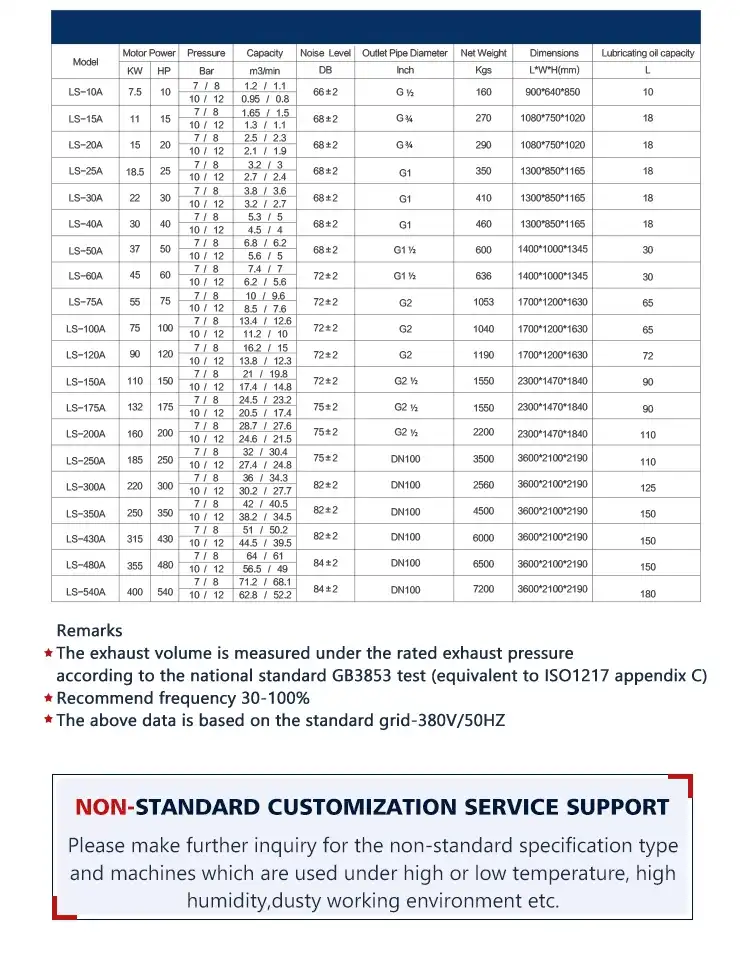
Oil bath
Air compressors require proper lubrication to function efficiently. The piston must draw air with minimal friction. Depending on their design, air compressors can either be oil-lubricated or oil-free. The former uses oil to reduce piston friction, while the latter splashes it on the cylinder bearings and walls. Such air compressors are commonly known as oil-flooded air compressors. In order to keep their oil baths clean, they are recommended for use in locations with high dust levels.
Start/stop control
An air compressor can be controlled by a start/stop control. This type of control sends a signal to the main motor that activates the compressor when the demand for air falls below a preset limit. This control strategy is effective for smaller air compressors and can be useful for reducing energy costs. Start/stop control is most effective in applications where air pressure does not change frequently and where the compressor is not required to run continuously.
To troubleshoot this problem, you need to check the power supply of your compressor. To check the supply side, use a voltage monitor to determine if power is flowing to the compressor. Ensure that the power supply to the compressor is steady and stable at all times. If it fluctuates, the compressor may not start or stop as expected. If you cannot find the problem with the air compressor power supply, it may be time to replace it.
In addition to the start/stop control, you may want to purchase additional air receivers for your air compressor. These can increase the capacity of air stored and reduce the number of times it starts and stops. Another way to decrease the number of starts per hour is to add more air receivers. Then, you can adjust the control to match your requirements. You can also install a pressure gauge that monitors the compressor’s performance.
Start/stop control for air compressors can be complex, but the basic components are relatively easy to understand. One way to test them is to turn the compressor on or off. It is usually located on the exterior of the motor. If you’re unsure of the location of these components, check the capacitors and make sure that the air compressor is not running while you’re not using it. If it does, try to remove the capacitor.
Variable displacement control is another way to adjust the amount of air flowing into the compressor. By controlling the amount of air, the control can delay the use of additional compressors until more required air is available. In addition to this, the device can also monitor the energy used in the compressor. This control method can result in substantial energy savings. You can even save on the amount of electricity by using variable displacement control. It is essential for efficient compressed air systems.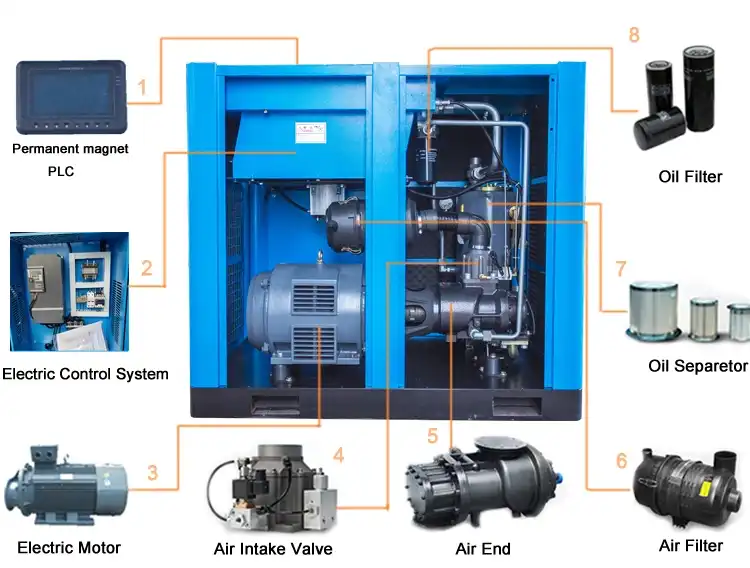
Variable speed drive
A VFD, or variable frequency drive, is a type of electric motor that adjusts its speed to match the demand for air. It is an efficient way to reduce energy costs and improve system reliability. In fact, studies have shown that a 20% reduction in motor speed can save up to 50% of energy. In addition, a VFD can monitor additional variables such as compressor oil pressure and motor temperature. By eliminating manual checks, a VFD will improve the performance of the application and reduce operating costs.
In addition to reducing energy costs, variable-speed drives also increase productivity. A variable-speed air compressor reduces the risk of system leaks by 30 percent. It also reduces the risk of system leaks by reducing pressure in the system. Because of these advantages, many governments are promoting this technology in their industries. Many even offer incentives to help companies upgrade to variable-speed drives. Therefore, the variable-speed drive can benefit many air compressor installations.
One major benefit of a variable-speed drive is its ability to optimize energy use. Variable frequency drives are able to ramp up and down to match the demand for air. The goal is to optimize the pressure and flow in the system so that the best “dead band” occurs between forty percent and eighty percent of full load. A variable-speed compressor will also increase energy efficiency because of its programmability.
A variable-speed air compressor can also be used to control the amount of air that is compressed by the system. This feature adjusts the frequency of power supplied to the motor based on the demand. If the demand for air is low, the frequency of the motor will reduce to save energy. On the other hand, if there is an excess demand for air, the variable-speed compressor will increase its speed. In addition, this type of air compressor is more efficient than its fixed-speed counterpart.
A VFD has many benefits for compressed air systems. First, it helps stabilize the pressure in the pipe network, thereby reducing the power losses due to upstream pressure. It also helps reduce the power consumption caused by fluctuations in upward pressure. Its benefits are also far-reaching. And as long as the air pressure and air supply is properly sized, a VFD will help optimize the efficiency of compressed air systems.


editor by CX 2023-04-07